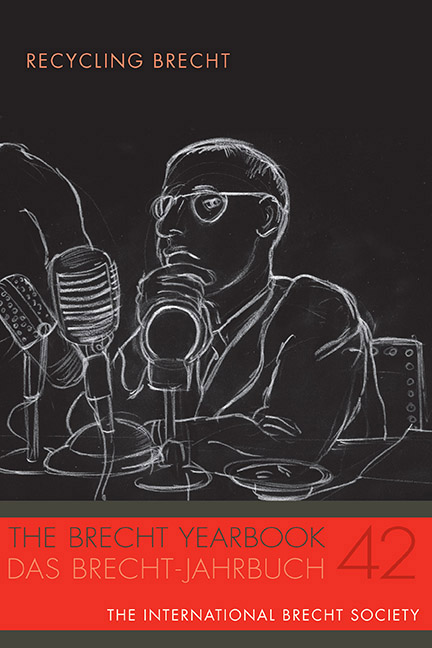Andreas Rumler. Exil als geistige Lebensform: Brecht und Feuchtwanger. Ein Arbeitsbündnis. Berlin: Edition A. B. Fischer, 2016. 160 pages.
Published online by Cambridge University Press: 09 April 2021
Summary
This readable and attractive book is an overview of the relationship between Bertolt Brecht and Lion Feuchtwanger between the year 1919, when the aspiring young playwright Brecht first appeared unannounced at Feuchtwanger's Munich door—he had brought an early draft of the play that later became known as Trommeln in der Nacht, and Feuchtwanger was impressed not only by the quality of the writing but also by the shabbiness of Brecht's outward appearance— and 1947, when Brecht paid a farewell call to Feuchtwanger at the latter's mansion, Villa Aurora in Santa Monica, California, shortly before his trip to the East Coast to be interrogated by the House Un-American Activities Committee. Even after Brecht's departure for Europe the day after his interrogation in Washington, DC, Brecht remained in contact with Feuchtwanger until his death nine years later, in August 1956. Feuchtwanger wrote to Brecht's widow Helene Weigel expressing consternation at his younger friend's death: “es fällt mir schwer, mich zurechtzufinden in einer Welt ohne Brecht. Wenn ich an Rückkehr nach Europa dachte, dachte ich immer zuerst an Brecht. Als er sich hier auf der Terrasse des Hauses von mir verabschiedete und darauf drängte, daß doch auch ich bald käme, war ich sicher, daß wir uns nicht auf lange trennten. Brecht war mir trotz aller Gegensätzlichkeiten sehr nahe” (153).
Although the two writers never became close enough friends to use the familiar “du” form of address with each other, preferring instead the more formal “Sie,” they had great respect for each other and also consulted and collaborated with each other on a number of important literary projects. Feuchtwanger's help was crucial for Brecht in his Munich years, when the older, more experienced, and better-known writer helped smooth Brecht's entry into the literary and theatrical world of the Bavarian capital. Together the two writers worked on plays like Leben Eduards des Zweiten von England and, much later, Die Gesichte der Simone Machard. Likewise, Feuchtwanger appears to have been the first to suggest to Brecht that he name his modern adaptation of John Gay's Beggar's Opera (1728) Dreigroschenoper.
- Type
- Chapter
- Information
- The Brecht Yearbook / Das Brecht-Jahrbuch 42Recycling Brecht, pp. 267 - 269Publisher: Boydell & BrewerPrint publication year: 2018

